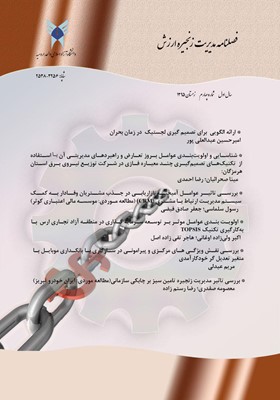شناسایی و اولویتبندی عوامل بروز تعارض و راهبردهای مدیریتی آن با استفاده از تکنیکهای تصمیمگیری چند معیاره فازی در شرکت توزیع نیروی برق استان هرمزگان
محورهای موضوعی : فصلنامه مدیریت زنجیره ارزشمینا صحرائیان 1 , رضا ا حمدی کهنعلی 2
1 - دانشآموخته کارشناسی ارشد مدیریت دولتی، دانشگاه هرمزگان، هرمزگان، ایران.
2 - دانشیار گروه مدیریت، دانشگاه هرمزگان، هرمزگان، ایران
کلید واژه: تاپسیس فازی, مدیریت تعارض, تعارض سازمانی, AHPفازی,
چکیده مقاله :
امروزه تعارض سازمانی و مدیریت تعارض از جمله مباحثی است که توجه مدیران و دستاندرکاران سازمان ها را به خود جلب نموده است. از این رو هدف این پژوهش شناسایی و اولویت بندی عوامل بروز تعارض و اولویت بندی سبک های مدیریتی تعارض در شرکت توزیع نیروی برق استان هرمزگان می باشد. این تحقیق از نظر هدف، کاربردی و از نظر روش تحقیق، توصیفی- پیمایشی می باشد. جامعه آماری پژوهش کلیه کارکنان شرکت توزیع نیروی برق شامل 157 نفر و در مرحله بعد مدیران و متخصصان منابع انسانی شامل 6 نفر میباشند. روایی پرسشنامه با نظر اساتید و خبرگان و پایایی کلی آن با روش آلفای کرونباخ با ضریب 0.88 تأیید شد. در این تحقیق با استفاده از بررسی کتابخانه ای و مطالعات میدانی صورت گرفته، عوامل بروز تعارض سازمانی به سه عامل اصلی (فردی، ارتباطی و ساختاری) با مجموع 20 شاخص، مشخص گردید. برای تجزیه و تحلیل دادهها از روش AHP فازی و روش تاپسیس فازی استفاده شد. نتایج تحقیق نشان داد، که عوامل فردی به عنوان مهمترین عامل بروز تعارض شناسایی شد. از بین عوامل فردی شاخص رقابت برای پاداش و محدودیت ادراک، در اولویت بالاتر در بروز تعارض سازمانی قرار دارند. از بین عوامل ساختاری شاخص سیستم ارزیابی و پاداش ناهماهنگ و ناهماهنگی توزیع قدرت و از بین عوامل ارتباطی شاخص تبعیض در روابط و نقص در سیستم اطلاعاتی اهمیت بیشتری دارند. همچنین طبق نتایج، ترجیح مدیران شرکت در به کارگیری سبک های مدیریتی تعارض به ترتیب سبک مصالحه و همکاری، سپس سازش و اجتناب و در نهایت سبک اجبار است.
Abstract Nowadays, organizational conflict and conflict management are the topics which attract organizations' manager and employees. So the aim of this study is to identifying and prioritizing the causes of conflict and conflict management styles in Hormozgan Province Electricity Distribution Company. This study in term of purpose and methodology are respectively functional and descriptive―survey. The study population in first step is all employees of Company concluded 157 persons and for the second step is managers and human resources professionals encluded 6 persons. The validity and general stability of questionaire proved through experts and Chronbach's Alpha with 0.88 factor respectively. In this study with the use of library search and reading the previous studies related to present search and experts' and professors' opinions, the factors of organizational conflict were determined to 3 main factors such as (individual, communication, structural) with the total 20 indexes. The fuzzy AHP was used for determining the weights and relative importance then the style of conflict management was prioritized by Tapsis fuzzy method. The results concluded that the individual factor was the most important factor for conflict event. Among the personal factor, the competition index for prize and understanding limitation was located in higher priority in organization conflict. Among the structural factor، the evaluation system and bonus inconsistent and uncoordinated distribution of power, and for the relational factor, the discrimination relations and defect in informational system gain significance. According to results, the manager's prefer in use of conflict management styles are respectively reconciliation and cooperation styles then agreement and avoidance and eventually force style.
_||_


